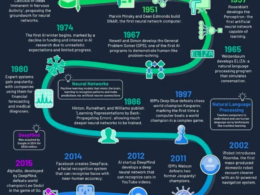the health strategist
foundation
the most compreehensive knowledge platform
for continuous health transformation
and digital health- for all
Joaquim Cardoso MSc.
Chief Research and Strategy Officer (CRSO),
Chief Editor and Senior Advisor
December 5, 2023
Society is not ready to respond if we bridge the gap to human general intelligence
The article highlights critical concerns and underscores the need for comprehensive governance in the realm of Artificial Intelligence (AI) development, particularly in the context of achieving human-level intelligence or AGI.
The central argument revolves around the necessity to prevent a single point of failure, emphasizing the urgency of establishing robust governance structures to address potential risks and ethical dilemmas associated with AI advancements.
- Diverse Governance Models and Stakeholder Involvement: Bengio discusses the need to reconsider the governance models for organizations pioneering AI research and development. Should these entities be for-profit, non-profit, nationalized, or a hybrid structure? He emphasizes the importance of democratic values and cautions against unchecked concentration of power, suggesting multi-stakeholder involvement in governance as a means to avoid conflicts of interest.
- Risks of Unchecked AI Advancements: The article sheds light on the risks inherent in unregulated AI progress, citing examples like the potential use of AI to manipulate elections or create lethal biological weapons. It draws parallels with the shortcomings in industries like oil and gas, highlighting the disparity between individual interests and societal well-being.
- Challenges of Governance Approaches: Bengio deliberates on the limitations of various governance approaches, be it private entities prioritizing profits, non-profits influenced by investors, or government-controlled initiatives vulnerable to misuse for authoritarian purposes or warfare.
- Urgent Need for Multi-Stakeholder Oversight: To ensure responsible AI governance, Bengio proposes a multi-stakeholder oversight structure involving national regulators, civil society, independent academics, and the international community. The goal is to prioritize safety-first research and prevent potential hazards arising from unchecked AI systems or misuse of breakthroughs like OpenAI’s speculated Q*.
- Implications of AGI Advancements: Drawing from his expertise in AI research, Bengio underscores the potential implications of advancements towards AGI, particularly in closing the gap of conscious cognition. He questions society’s readiness to cope with the potential consequences of reaching human-level intelligence and stresses the urgency for a democratic discussion on governance aligned with societal values.
In conclusion, the article emphasizes the criticality of immediate and inclusive discussions on AI governance aligned with democratic principles.
It highlights the need for proactive measures to address the ethical, safety, and societal implications of advancing AI technologies, urging stakeholders to prioritize collective well-being over individual gains to avoid potential catastrophic outcomes in the AI domain.
This is an Executive Summary of the article “For true AI governance, we need to avoid a single point of failure”, published on the Financial Times, and written by YOSHUA BENGI
Originally published at https://www.ft.com.












